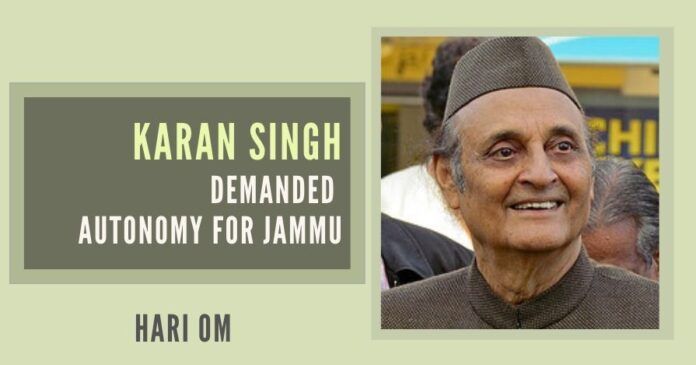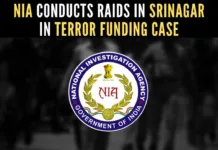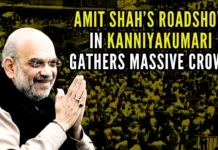
As Head of the semi-autonomous state and son of Jammu, Karan Singh, knew what was happening over and beneath the surface
On November 17, 1952, Karan Singh, son of the last Dogra ruler, Maharaja Hari Singh, was appointed Sadar-e-Riyasat of Jammu and Kashmir (J&K) State, which now stands divided into Union Territory (UT) of J&K and UT of Ladakh. He served the State in that capacity till March 30, 1965. That day, he became the first Governor of the State. He held that position till May 15, 1967, when he took the plunge and contested the Lok Sabha election, which he won hands down from the Kathua-Udhampur-Doda constituency. (In 1965, Prime Minister, Lal Bahadur Shastri, abolished the offices of Sadar-e-Riyasat and Wazir-e-Azam and introduced the offices of Governor and Chief Minister in J&K. It was also in 1965 that Congress opened its branch in J&K, that the National Conference (NC) of Sheikh Abdullah converted itself into the Congress and that the Congress rule in J&K under GM Sadiq established in the State.”
As Head of the semi-autonomous state and son of Jammu, Karan Singh, knew what was happening over and beneath the surface. He knew the NC and the nature of its leadership and its ideology as well as the Kashmiri Muslim leadership’s attitude towards the people of Jammu province. He knew the nature of the role the Muslim Conference/NC had played since its inception in 1932. He was also fully aware of what had further embittered the already rather bitter relations between Jammu (which remained at the helm in the state from March 1846 to October 1947) and Kashmir (to which power was transferred from Jammu by PM JL Nehru with a stroke of the pen in October 1947). He also knew the nature of the problems the Cold-Desert and strategic Ladakh faced. He was convinced that the state would wither away if its politico-administrative, economic and constitutional structure was not reformed taking into consideration the aspirations, the needs, and the compulsions of the people of Jammu and Ladakh.
The charge so shook and shocked Karan Singh that he, on July 10, 1967, wrote a long letter of protest to PM Indira Gandhi – letter in which he again warned that the state would break if remedial measures were not taken and lambasted the J&K Congress leadership.
Karan Singh took the first initiative on January 19, 1956, to draw the attention of PM Nehru to the fast-deteriorating political situation in the state. What had provoked or motivated him to take up the whole issue with the Indian PM was the exclusion of J&K from the States Reorganization Commission. That day, he wrote a letter to Nehru, which, among other things, read: “…It appears that J&K was considered by the Commission to be outside their terms of reference, for they have made no recommendations for the state…There are some important points which do have a direct bearing upon our state and which, I feel, deserve serious consideration. Among these, I would, at this time, like to mention the following: The omission will be exploited and misinterpreted by interested parties, while inclusion will act as a stabilizing and beneficial factor. The recommendations concerning safeguards for linguistic minorities, to which the Government of India attaches great importance, are sharply relevant in our case. As you know, there are two important linguistic minorities in this state, the Dogras (of Jammu) and the Ladakhis, and I am sure that no one will want them to be deprived of the safeguards that are provided for other linguistic minorities in the rest of India…” (Verma, Raghav, An Examined Life: Essays and Reflections by Karan Singh, PP. 251-252). In other words, he virtually suggested a reorganization of the state as a solution to the problems facing the people of Jammu and Ladakh.
The very next day (Jan 20), PM Nehru plainly told Karan Singh that “the question of including J&K in our decisions regarding States Reorganization did not arise”. “It is, of course, possible to include that state in the Northern Zone. But that will have to be subject to the approval of the J&K Government…It would certainly be a good thing for safeguards to be given for linguistic minorities in J&K. How exactly this could be done will have to be thought” (P.253). It is hardly necessary to reflect on the Nehru’s response to the Singh’s suggestions as what the former said was self-explanatory. Suffice it to say that J&K was not given place even in the Northern Zone. The reasons are not really difficult to fathom.
Seemingly committed as he was to persuading the Kashmir’s ruling elite and powers-that-be in New Delhi to appreciate the problems facing Jammu and Ladakh and take steps calculated to meeting their urges and aspirations, Karan Singh took up the issue with them from time to time during the next 13 years or so. However, all his efforts failed. In fact, his sincere efforts only annoyed what could be legitimately termed as the biased, arrogant, and unaccommodating Kashmir’s ruling elite. So much so, the Kashmiri leadership went to the extent of declaring that Karan Singh was playing into foreign hands. The charge so shook and shocked Karan Singh that he, on July 10, 1967, wrote a long letter of protest to PM Indira Gandhi – letter in which he again warned that the state would break if remedial measures were not taken and lambasted the J&K Congress leadership.
It would be only desirable if what he said in his letter is quoted verbatim. Such an exercise will help put things in perspective. His letter read like this: “I write this letter to lodge a strong protest against a further flagrant breach of trust by the ruling group of the state Congress party. You will recall that for some time I have been feeling that the present political structure of the state does not fulfill the genuine and democratic aspirations of the people of its three regions – Kashmir, Jammu, and Ladakh. One of the approaches could be to proceed with a linguistic reorganization of the state, as has been done elsewhere in India. As this presented certain difficulties, it was suggested that a solution within the framework of the present state should be considered. I formulated some tentative proposals on these lines before the general elections when I was still Governor and had some discussions with GM Sadiq, Syed Mir Qasim, and DP Dhar. They agreed that the problem of fulfilling regional aspirations did exist, and solemnly promised that they would consider my proposals carefully after the elections were over.”
What did Karan Singh say in his letter to Indira Gandhi about the growing “consciousness” in Jammu and what would happen if the powers-that-be in the State and at the Centre failed to appreciate it?
“I regret to say, however, that at his very first press conference after he became Chief Minister, following the general elections, Sadiq thought fit to oppose the idea of regional autonomy within the framework of the present state. Subsequently, he and J&K Pradesh Congress Committee (PCC) President Syed Mir Qasim made public statements on several occasions reiterating their opposition to any such move. Recently, as I mentioned to you, they have also launched a vicious campaign in Jammu, spearheaded by a Government body known as the Field Survey Organization in which they have tried to completely distort the whole idea of regional autonomy and arouse caste and communal prejudices against it. All this while, I have scrupulously refrained from making any public statement on this matter, in deference to your wishes and in the hope that the ruling group in the state will ultimately see reason.”
“On the July 7th, however, the Executive Committee of the J&K Pradesh Congress passed a long resolution in which inter-alia it openly condemned the idea of autonomy as ‘part of the same shop-soiled and oft-peddled solution of fragmenting the state and thus delivering it into the hands of Pakistan, on the one hand, and China, on the other’. The resolution added: …In view of the sinister design concealed behind such disruptive and suicidal moves, the Executive Committee of the Pradesh Congress calls upon the people of the country in general and of the state, in particular, to be beware of the machination of the wider conspiracy of interested powers to drive a wedge among the people’. At a Press Conference in which this resolution was released, a report of which I enclose, Syed Mir Qasim was asked how regional autonomy within the framework of the State Constitution would lead to dismemberment. He replied that he clearly saw a foreign hand behind such a move, and added that disciplinary action was being taken against those associating with this move.”
“This statement, at a time when the Chief Minister had assured you (Indira Gandhi) that he would discuss the matter with me, is not an only deplorable breach of faith but can only be interpreted as a direct and deliberate provocation. I may add that the present PCC is an entirely nominated body and that the technique of labeling any idea which does not suit them as ‘foreign-inspired’ is one which the present states Congress leaders have persistently employed, in an attempt to cast doubts upon the bona fides of those with whom they disagree.”
“Under these circumstances, you will appreciate that my political position has been gravely embarrassed. On the one hand, it has been your wish that I should not say anything publicly in this matter. On the other, the ruling group in the state continues a dual policy of public denunciation and covert slander and distortion against the idea of autonomy. I am, therefore, writing to you in considerable distress, and would request you to agree to one of the following alternatives:
- I may be given the freedom to clearly enunciate my views at a series of public meetings which I will organize in Jammu, the Valley, and Ladakh.”
- A small Cabinet Committee is immediately set up to go into this whole issue, and a public announcement to this effect made.”
His operative part was: “As a Congressman, I am deeply disturbed at the fact that the Congress Party in the state – in the Valley, in Jammu as well as in Ladakh – is getting dangerously isolated from the genuine aspirations of the people. If the present situation is allowed to continue, there is a danger that under stress the whole structure may collapse, thus causing a grave setback to the national interest.”
What did Karan Singh say in his letter to Indira Gandhi about the growing “consciousness” in Jammu and what would happen if the powers-that-be in the State and at the Centre failed to appreciate it? He wrote: “Since the State of J&K was founded in 1846, right up to Independence in 1947, Jammu had a predominant position in view of the fact that it provided the ruling class. This undemocratic situation came to an end with Independence. Unfortunately, it was replaced not by a rational sharing of power between the two provinces but by the reverse domination of Kashmir over Jammu, which was unfair and unacceptable as the earlier position. This has lasted for twenty years. The situation today is that political consciousness is steadily growing in Jammu and with it the predominant feeling that if the state is to remain as one unit this can be only on the basis of both the provinces getting a fair deal. Discontentment over the present set-up has been long-simmering and has erupted violently from time to time, most recently in the Jammu students’ agitation last October…” (P. 261). (In 1966, four students of GGM Science College lost their lives in police firing while agitating for separate Jammu University and engineering college and the whole of Jammu had exploded.)
He also wrote: “Although several other states in India have regional pulls, the position of Jammu is entirely different because its separate personality forms a basic feature of the State itself” (PP. 258-260).
It needs to be underlined that Indira Gandhi herself had asked Karan Singh to prepare a paper on regional autonomy. And he sent a copy of the paper to Indira Gandhi for her consideration.
He further wrote: “There is much strength in the view that the unhappy relations between Jammu and Kashmir inter-state are to a large extent responsible for the patently unsatisfactory, indeed explosive, overall political situation in the state. A bold and realistic attempt to meet the genuine aspirations of Jammu province can be expected to open up new avenues for political improvements within the Valley…One political fact has now to be squarely faced. If Jammu continues to feel that its legitimate rights cannot be ensured within the framework of the present state, the demand for a complete break away from Kashmir is certain to grow. There are three clear alternatives open at present” (P. 262).
Two things were clear from what he wrote to Indira Gandhi. One was that maintaining the status quo would be suicidal. The other was that he actually pitched for the reorganization of the state on a linguistic basis (read trifurcation of the state into Jammu, Kashmir, and Ladakh), but he insisted considering Nehru no to it. However, he was ready to accept autonomy for Jammu province and Kashmir within the state and a special arrangement for Ladakh.
“The first alternative is evidently unsatisfactory because the continuance of the status quo will only lead to increasing political frustration, resulting ultimately in an explosive situation which we must seek to avoid. Statesmanship lies in meeting a genuine demand well before it reaches the point of ignition, and it will be tragic if vested interests (read Kashmiri leaders) are allowed to veto any proposal for improvement. Leaving aside the second alternative for the time being, although there are strong arguments in its favour,” I would want the Union Government to go in for the third option: Regional autonomy for Jammu province and Kashmir region within the state, Karan Singh, in fact, said (P-263).
It needs to be underlined that Indira Gandhi herself had asked Karan Singh to prepare a paper on regional autonomy. And he sent a copy of the paper to Indira Gandhi for her consideration. “Meanwhile, as suggested by you (Indira Gandhi) when we met on an earlier occasion, I prepared a paper on this question of regional autonomy which I enclose. In case you would like to circulate it to some of your Cabinet colleagues or others, I am sending separately 20 spare copies. The paper had been ready for the last few weeks, but I deliberately refrained from sending it to you as I did not wish to force the pace. The recent action of GM Sadiq and his colleagues, however, has left me with no alternative but to take up this matter with you. I will be available for further discussion at your convenience, but I thought it my duty to convey my views to you as early and as frankly as possible,” Karan Singh said in this regard (P. 258).
The fundamental objectives of Karan Singh’s scheme were three:
- “To ensure that on a clear recognition of Jammu’s personality and problems, its people enjoyed the satisfaction of a genuine sharing of political power, a fair share of services broadly commensurate with their population within the state, and adequate attention to their economic and developmental problems – especially irrigation, power, and communications.”
- To ensure that Kashmir benefits equally from the new changes so that the sum total of political satisfaction in the state is substantially increased.”
- To ensure that Ladakh, with its peculiar geographical and strategic situation, receives the special attention that it deserves” (P. 263).
Karan Singh wanted to achieve these objects through separate “Provincial Legislatures”, separate “Provincial Executive Councils”, Separate “Planning Boards”, separate “Provincial Public Service Commissions” and separate “Provincial Deputy Advocate Generals” (PP. 264-267).
As a matter of fact, he wanted the Provincial Legislatures to handle 34 subjects as mentioned in the state List in the Constitution of India leaving the 31 others to the care of the “Full State Legislature”. These 34 subjects were: Public order, except border security; Police except border police, special police and KAP; Prisons; local government; Public Health and Sanitation; Pilgrimages, other than pilgrimages outside India; Production, manufacture, possession, transport, purchase and sale of intoxicating liquors; Burial and Burial Grounds, Cremation and Cremation Grounds; Libraries, Museums, ancient and historical monuments and Records; Education, except technical, professional and university education; Agriculture (except agricultural education and research); Land Improvement and Agriculture Loans and Colonization; Forests; Wild Life and birds; Fisheries; Cottage and small-scale industries; Markets and Fairs; Theatres, Dramatic Performance, Sports, Entertainment, Amusement parks and Cinemas; Literary, Scientific, Religious and other societies and associations, Cooperative Societies; Betting ad Gambling; Taxes on Agricultural Income; Duties in respect of succession to agricultural land; Estate Duty in respect of agricultural land; Taxes on entry of goods, use or sale thereon; Taxes on Animals and Boats; Tolls; Taxes on Luxuries, including Taxes on Entertainment, Amusements, Betting and Gambling; Offence against laws with regard to any matters in this list etc (PP 267-269).
Sadly, neither Indira Gandhi and Rajiv Gandhi did anything to address the concerns of the people of Jammu and Ladakh nor PV Narasimha Rao and Manmohan Singh did anything. On the contrary, Indira Gandhi entered into power-sharing and political accords with Sheikh Abdullah in 1975, Rajiv Gandhi entered into an accord with Farooq Abdullah in 1986, Sonia Gandhi entered into an accord with Mufti Sayeed in 2002 and Farooq Abdullah and Omar Abdullah in 2008-2009 over the heads of Jammu and Ladakh. Paradoxically, the BJP also pursued the Congress line and entered into a political and power-sharing accord with Mufti Sayeed and Mehbooba Mufti in 2015. It was only in June 2018 that PM Narendra Modi and the then BJP president Amit Shah (now Union Home Minister) appreciated the national sentiment and brought down the Mehbooba-BJP Government in J&K and put the state on a road leading to its full integration into India on August 5-6, 2019. Article 35A and Article 370 were abolished. The state was broken into two UTs’. Almost all the Central Laws applied to both the UTs. Hindu-Sikh refugees of all varieties in Jammu and many non-J&K Indians granted the right to obtain Domicile Certificates and enjoy all rights in J&K. I will not reflect on why Karan Singh quit Congress on a couple of occasions and rejoined it. However, I would certainly say two things. One, Karan Singh’s views were hardly appreciated by Congress. Two, Jammu continues to simmer and cry for an adequate share in the governance of the UT.
Note:
1. The views expressed here are those of the author and do not necessarily represent or reflect the views of PGurus.
- ‘Kashmir My core constituency’: Revisiting July 12, 2003 to understand politics, Omar Abdullah-style - March 15, 2024
- Total deviation from traditional approach: Seven takeaways from PM Modi’s March 7 Srinagar visit - March 9, 2024
- Status of political parties: Why is further J&K reorganization imperative? - March 1, 2024










